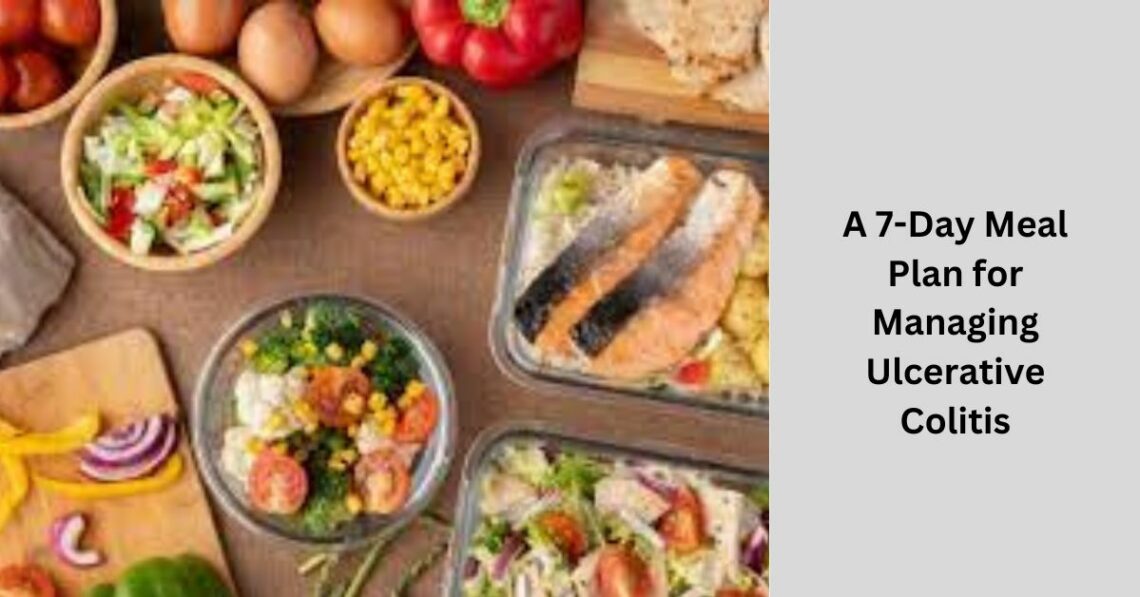
Nourishing the Gut: A 7-Day Meal Plan for Managing Ulcerative Colitis
Living with ulcerative colitis can be challenging, but a carefully crafted meal plan can make a significant difference in managing symptoms and promoting overall gut health. Ulcerative colitis is a chronic inflammatory bowel disease that requires a thoughtful approach to nutrition. In this article, we’ll explore a 7-day meal plan designed to support individuals with ulcerative colitis, providing nourishment while minimizing triggers that may exacerbate symptoms.
Day 1:
Breakfast: Oatmeal with sliced bananas and a drizzle of honey.
Snack: Greek yogurt with blueberries.
Lunch: Grilled chicken salad with mixed greens, cucumber, and a light olive oil dressing.
Snack: Rice cakes with almond butter.
Dinner: Baked salmon with quinoa and steamed asparagus.
Day 2:
Breakfast: Scrambled eggs with spinach and whole-grain toast.
Snack: Sliced apples with a handful of walnuts.
Lunch: Turkey and avocado wrap with whole-grain tortilla.
Snack: Carrot and cucumber sticks with hummus.
Dinner: Stir-fried tofu with brown rice and broccoli.
GEEKZILLA AUTOS: PIONEERING THE FUTURE OF AUTOMOTIVE INNOVATION
Day 3:
Breakfast: Smoothie with spinach, banana, almond milk, and a scoop of protein powder.
Snack: Cottage cheese with pineapple chunks.
Lunch: Quinoa salad with cherry tomatoes, feta cheese, and a lemon vinaigrette.
Snack: A small handful of grapes.
Dinner: Grilled shrimp with sweet potato wedges and sautéed spinach.
OAKLEY RAE: A DIGITAL MAVEN MAKING A DIFFERENCE
Day 4:
Breakfast: Whole-grain pancakes with strawberries and a dollop of Greek yogurt.
Snack: Mixed berries with a sprinkle of chia seeds.
Lunch: Lentil soup with a side of whole-grain crackers.
Snack: Rice pudding made with lactose-free milk.
Dinner: Baked chicken breast with mashed potatoes and green beans.
Day 5:
Breakfast: Overnight oats with almond milk, chia seeds, and raspberries.
Snack: Sliced kiwi with a handful of cashews.
Lunch: Quinoa and black bean bowl with avocado and salsa.
Snack: Banana with peanut butter.
Dinner: Grilled tilapia with couscous and roasted Brussels sprouts.
Day 6:
Breakfast: Whole-grain waffles with sliced peaches and a drizzle of maple syrup.
Snack: Celery sticks with cream cheese.
Lunch: Spinach and feta omelet with a side of mixed berries.
Snack: Trail mix with nuts and dried fruit.
Dinner: Vegetable stir-fry with tofu and brown rice.
Day 7:
Breakfast: Chia seed pudding with coconut milk and mango chunks.
Snack: Orange slices with a handful of almonds.
Lunch: Quinoa-stuffed bell peppers with a side of mixed greens.
Snack: Hummus with whole-grain pita.
Dinner: Grilled steak with sweet potato fries and sautéed zucchini.
Key Considerations:
Stay Hydrated: Drink plenty of water throughout the day to maintain hydration and support digestion.
Portion Control: Opt for smaller, more frequent meals to avoid overwhelming the digestive system.
Individualized Approach: Pay attention to your body’s responses and adjust the meal plan to suit your specific needs and preferences.
MIGUEL GALLEGO ARÁMBULA: NAVIGATING LIFE BEYOND THE LIMELIGHT”
Consult a Professional: Before making significant changes to your diet, consult with a healthcare professional or a registered dietitian to ensure the plan aligns with your individual health requirements.
Balancing Nutrients:
This meal plan emphasizes a balanced intake of macronutrients and micronutrients essential for overall health. Breakfast starts with oatmeal, a fiber-rich whole grain that aids digestion and provides sustained energy. Bananas add potassium, known for its role in gut health. A mid-morning Greek yogurt snack introduces probiotics, promoting a healthy balance of gut bacteria.

Lunch includes lean protein from grilled chicken, and a salad with varied greens introduces vitamins and antioxidants. Healthy fats in the form of olive oil contribute to anti-inflammatory benefits. The afternoon snack focuses on rice cakes, a gentle carbohydrate source, and almond butter, offering healthy fats and protein. The day concludes with baked salmon, supplying omega-3 fatty acids crucial for reducing inflammation.
Boosting Gut-Friendly Foods:
Smoothies for breakfast on Day 3 incorporate spinach, rich in vitamins and minerals, along with almond milk for a lactose-free alternative. A mid-morning snack featuring cottage cheese provides a protein source while also introducing beneficial probiotics. Lunch includes quinoa, a gluten-free grain high in fiber and protein, paired with a lemon vinaigrette for added flavor without irritating ingredients.
PLUNDERING IN THE APOCALYPSE: SURVIVAL INSTINCTS OR MORAL DECAY?
Afternoon features grapes, a low-residue fruit for easy digestion. The evening meal includes tofu, a plant-based protein, with brown rice and broccoli, promoting a well-rounded, plant-focused dinner.
Exploring Variety:
Day 5 introduces variety through a protein-packed breakfast of whole-grain pancakes, providing complex carbohydrates and strawberries for added vitamins. The mid-morning snack combines mixed berries with chia seeds for a fiber and omega-3 boost. Lentil soup at lunch introduces a plant-based protein source along with a side of whole-grain crackers for easy digestion. The afternoon snack includes rice pudding made with lactose-free milk, offering comfort and nutrients without dairy-induced discomfort. Dinner features grilled tilapia, a light and easily digestible protein, with couscous and Brussels sprouts for fiber and vitamins.
UNVEILING THE IS OFLEAKED LEGIT”: NAVIGATING THE CONTROVERSY
Incorporating Plant-Based Options:
The final day focuses on incorporating more plant-based options. Chia seed pudding for breakfast features coconut milk, adding healthy fats. An orange and almond mid-morning snack provides vitamin C and protein. Lunch involves quinoa-stuffed bell peppers, incorporating fiber-rich quinoa and a mix of colorful vegetables. The afternoon snack includes hummus with whole-grain pita for a satisfying and gut-friendly option. Dinner concludes the week with grilled steak, offering a rich source of iron and protein, accompanied by sweet potato fries and zucchini for a nutrient-dense meal.
Staying Hydrated and Mindful Portions:
Throughout the week, staying hydrated is emphasized, as water is essential for maintaining gut health and aiding digestion. Smaller, more frequent meals help avoid overwhelming the digestive system, allowing for better absorption of nutrients.
Individualized Approach:
It’s crucial to recognize that everyone’s body responds differently to foods. Individualized adjustments based on personal preferences, intolerances, and sensitivities should be considered. Listening to one’s body and adapting the meal plan accordingly ensures a more sustainable and comfortable dietary approach.
Professional Guidance:
Before making significant dietary changes, consulting healthcare professionals, such as gastroenterologists or registered dietitians, is recommended. These experts can provide personalized advice, ensuring the meal plan aligns with individual health needs and specific requirements related to ulcerative colitis.
Conclusion:
A well-balanced and carefully planned meal routine can play a crucial role in managing ulcerative colitis symptoms. By focusing on nourishing, easily digestible foods and being mindful of individual triggers, individuals with ulcerative colitis can empower themselves to lead a healthier and more comfortable life. Always remember to consult with healthcare professionals for personalized advice and guidance on managing this chronic condition.
You May Also Like

Optimizing Washing Machine Drainage: A Detailed Exploration
February 19, 2024
Homeworkify: Revolutionizing Education Through Innovative Homework Solutions
January 12, 2024

